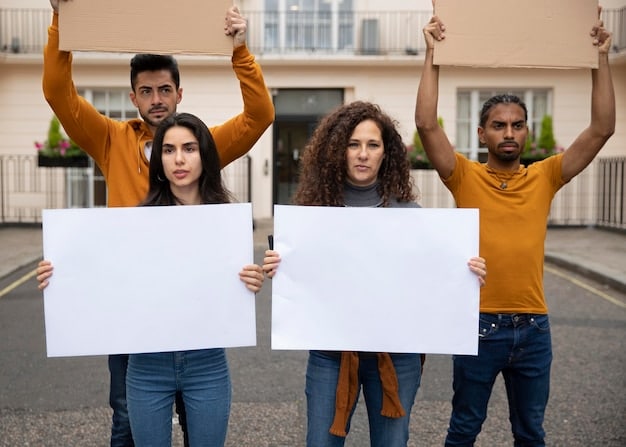Effective Ways to Support & Empower Undocumented Immigrants in the US

Effective support and empowerment for undocumented immigrants in the US involve legal aid, access to education and healthcare, community support networks, advocacy for policy changes, and promoting economic opportunities and inclusion.
Undocumented immigrants face unique challenges in the United States. Understanding what are the most effective ways to support and empower undocumented immigrants in the US is crucial to fostering a more just and equitable society.
Understanding the Challenges Faced by Undocumented Immigrants
Undocumented immigrants encounter numerous obstacles that affect their daily lives. These challenges span legal, economic, social, and psychological domains, making their experiences particularly complex and demanding.
Legal and Policy Barriers
Navigating the legal landscape is one of the most significant hurdles for undocumented immigrants. They often lack access to legal representation and face the constant threat of deportation.
Economic Struggles
Many undocumented immigrants work in low-wage jobs with limited opportunities for advancement. Their lack of legal status restricts their ability to secure stable employment and fair wages.

Additionally, due to their status, they can be particularly vulnerable to exploitation by employers.
- Limited access to financial resources and assistance programs.
- Difficulty obtaining secure and well-paying employment.
- Vulnerability to wage theft and unfair labor practices.
These barriers perpetuate a cycle of poverty and instability, making it difficult for undocumented immigrants to improve their living conditions.
Providing Access to Legal Resources and Representation
Access to legal resources is critical for undocumented immigrants facing deportation, navigating complex immigration laws, or seeking pathways to legal status. Legal representation can significantly improve their chances of a favorable outcome.
Non-profit organizations and legal aid societies offer free or low-cost legal services to those who cannot afford private attorneys. These services include consultations, legal representation in immigration court, and assistance with applications for visas or asylum.
The Role of Pro Bono Lawyers
Pro bono lawyers play an essential role in providing legal assistance to undocumented immigrants. Many law firms and attorneys dedicate a portion of their time to offering free legal services to those in need.
- Increased awareness and understanding of immigration laws among undocumented immigrants.
- Improved outcomes in immigration court proceedings.
- Greater access to legal pathways to citizenship or residency.
However, the demand for legal services far outweighs the available resources, highlighting the need for increased funding and support for legal aid organizations.
Enhancing Educational Opportunities
Education is a powerful tool for empowerment, providing undocumented immigrants with the skills and knowledge they need to succeed. Access to education can open doors to better employment opportunities and improved quality of life.
Many states have policies that allow undocumented students to attend public colleges and universities at in-state tuition rates. This can make higher education more accessible and affordable.

Scholarships and Financial Aid
Scholarships and financial aid programs specifically designed for undocumented students can help alleviate the financial burden of higher education.
Organizations that support undocumented students realize the important role that scholarships play in helping these students afford higher education and complete these programs.
- Greater access to higher education for undocumented students.
- Improved academic outcomes and graduation rates.
- Enhanced career prospects and economic mobility.
Educational opportunities also extend beyond formal schooling. Vocational training programs, adult education classes, and English language courses can provide undocumented immigrants with valuable skills and knowledge.
Ensuring Access to Healthcare Services
Access to healthcare is a fundamental human right, yet undocumented immigrants often face significant barriers to obtaining medical care. Many lack health insurance and may be hesitant to seek care due to fear of deportation.
Community health centers and free clinics provide essential healthcare services to underserved populations, including undocumented immigrants. These facilities offer primary care, preventive services, and treatment for chronic conditions.
Advocating for Inclusive Healthcare Policies
Advocating for policies that expand access to healthcare for undocumented immigrants is crucial. This includes advocating for state and local initiatives that provide healthcare coverage to all residents, regardless of immigration status.
These policies have the potential to significantly improve the health and well-being of undocumented immigrants, as well as the broader community.
- Improved health outcomes for undocumented immigrants.
- Reduced rates of preventable diseases and chronic conditions.
- Decreased healthcare costs through early intervention and preventive care.
It’s also important to create culturally competent healthcare services that reduce stigma and promote trust between healthcare providers and undocumented immigrants.
Building Supportive Community Networks
Community support networks play a vital role in empowering undocumented immigrants by providing a sense of belonging, mutual support, and access to resources. These networks foster resilience and promote well-being.
Local organizations and community groups offer a range of services such as food banks, clothing drives, and assistance with housing. These resources can help meet basic needs and alleviate financial stress.
Creating Safe Spaces
Creating safe spaces where undocumented immigrants can share their experiences, access support, and build community is essential. These spaces provide a sense of safety and belonging, fostering empowerment and resilience.
These programs include ESL classes, citizenship preparation courses, and leadership development training. They can help immigrants gain new skills, build confidence, and become more engaged in their communities.
- Increased social support and reduced feelings of isolation.
- Greater access to resources and services.
- Enhanced empowerment and resilience.
Investing in community-based initiatives can significantly improve the lives of undocumented immigrants, fostering a sense of belonging and promoting social inclusion.
Advocating for Policy Changes
Advocating for policy changes is essential to creating a more just and equitable society for undocumented immigrants. This involves working to reform immigration laws, protect immigrant rights, and promote policies that support integration and inclusion.
Grassroots movements and advocacy organizations play a critical role in raising awareness about the challenges faced by undocumented immigrants and advocating for policy changes.
Supporting Comprehensive Immigration Reform
Supporting comprehensive immigration reform is a key step towards creating a fair and just immigration system. This includes advocating for pathways to citizenship for undocumented immigrants.
These factors collectively shape the movement’s ability to influence public opinion, mobilize support, and drive policy changes at the local, state, and federal levels.
- Creating pathways to citizenship for undocumented immigrants.
- Protecting the rights of immigrants and their families.
- Promoting policies that support integration and inclusion.
It also involves working to ensure that immigration laws are enforced fairly and humanely, with due process protections for all.
| Key Point | Brief Description |
|---|---|
| ⚖️ Legal Aid | Providing access to legal representation and resources. |
| 🎓 Education | Enhancing educational opportunities through scholarships and inclusive policies. |
| 🏥 Healthcare | Ensuring access to healthcare services and promoting inclusive policies. |
| 🤝 Community | Building supportive community networks and safe spaces. |
Frequently Asked Questions (FAQ)
▼
Undocumented immigrants often face challenges such as limited access to employment, healthcare, and education, as well as the constant threat of deportation, leading to significant stress and instability.
▼
Legal aid organizations provide free or low-cost legal services, including representation in immigration court, assistance with visa applications, and guidance on navigating complex immigration laws.
▼
Access to education empowers undocumented immigrants by providing them with skills, knowledge, and opportunities for better employment, improved quality of life, and greater social inclusion.
▼
Community support networks provide a sense of belonging, mutual support, and access to resources, fostering resilience and promoting well-being among undocumented immigrants facing unique hardships.
▼
Advocating for policy changes helps create a more just and equitable society by reforming immigration laws, protecting immigrant rights, and promoting policies that support integration and inclusion.
Conclusion
Supporting and empowering undocumented immigrants requires a multifaceted approach that addresses their legal, educational, healthcare, and social needs. By providing access to resources, advocating for policy changes, and building supportive communities, we can create a more just and equitable society for all.





